Five more states went to the polls in the United States last night and there were yet more overwhelming victories for frontrunners Donald Trump and Hillary Clinton, who now look set on the path to becoming their respective party's nominees.
Mr Trump swept all five states, while Mrs Clinton took five and Bernie Sanders winning one.
The "Stop Trump" pact made by the other Republican candidates - Ted Cruz and John Kasich - appears to have been completely ineffective.
RTÉ's Washington Correspondent Caitríona Perry looks at where the campaign is at now:
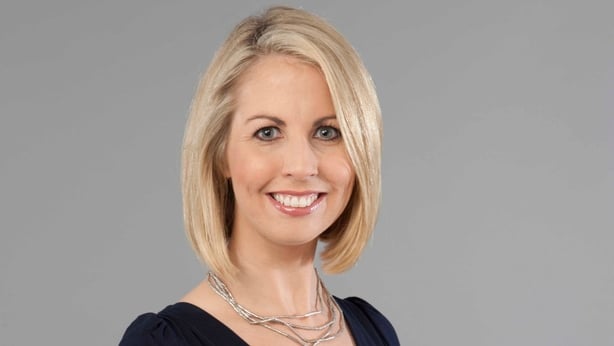
Five more victories for Donald Trump last night - is his candidacy looking more likely now and is the prospect of a contested convention diminishing?
Yes. As he would say himself it was "yuuuuuugggge" night.
He is getting very close to 1,000 delegates. After last night's votes he has won at least 105 of the 118 delegates and is sitting at 949. That takes him quite near to the magic 1,237 - the number of delegates he needs (50% plus 1) to be declared the Republican nominee.
With another few states he will be there or thereabouts and that will put him in the position of either making the number or being so close that he cannot be denied.
In addition, exit polls last night in Connecticut, Maryland and Pennsylvania showed that between 65% and 70% of Republican voters said that if nobody reached the simple majority at the convention, the nomination should go to the person with the highest number of delegates.
That is consistent with what GOP voters have said all along.
When asked about it last night, he said: "I consider myself the presumptive nominee. Absolutely".
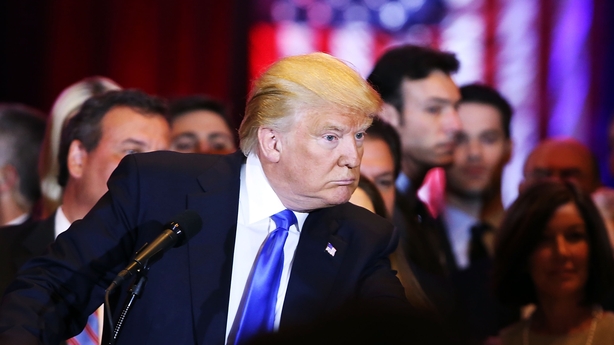
That was followed by another quote: "I went to the best schools. I'm, like, a very smart person. I'm gonna represent our country with dignity."
Mr Trump's results last night show that he is now appealing to a broad array of voters, that he is capitalising on an anger, and an economic frustration that is felt across all strands of America.
Mr Trump was always predicted to do well in New Jersey and West Virginia, but if he wins in Indiana on Tuesday and then the big one in California on 7 June, he could have enough delegates to make that 1,237 and the much discussed contested or brokered convention will not materialise.
One of the states Trump won is Pennsylvania - has that a great significance for his campaign now and at the convention?
Only 17 of the delegates there are assigned. 54 of them remain "unbound" so in other words they can vote for whoever they want to at the convention.
Now at least half had said in advance that they would vote for the person who wins the state, but they are not legally bound to do so.
However, with a winning margin of 57% of the vote many would feel compelled to vote for Mr Trump.
The billionaire businessman now looks set to come so close to the 1,237 that these unbound delegates could be the ones to take him over that finish line.
What happened to the pact made by Ted Cruz and John Kasich that Cruz would abandon last night's states and that Kasich would abandon Indiana voting next week in an effort to reduce Trump's vote. Did that pay off in any way?
Not really you would have to say, given we saw such huge margins for Mr Trump in all five states.
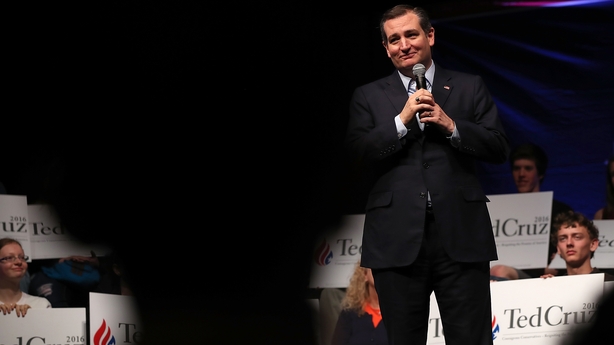
This pact really came too late in the game. It may have had an impact if it had been announced a few weeks ago. However, announcing it just a day or two before people go to the polls is running a risk of confusing establishment voters about what they are supposed to do, and also a risk that voters interpret the strategy as being instructed on who to vote for.
Also Mr Kasich was due to be in Indiana last night but cancelled his rally there as part of the pact and did not schedule another, meaning he was the only candidate who did not have any access to the all-important air time in the US tonight.
That Indiana primary next Tuesday is really the firebreak for the "Stop Trump" campaign. If Mr Trump wins there, especially by a big margin, it is hard to see how he can be stopped.
Not quite a clean sweep for Clinton in the Democratic Party - but a good night nonetheless?
Yes a great night for the Clinton campaign for a number of reasons.
She builds on her victory from New York last week and with four state wins last night she has ended the losing streak she had been on for the last few weeks.
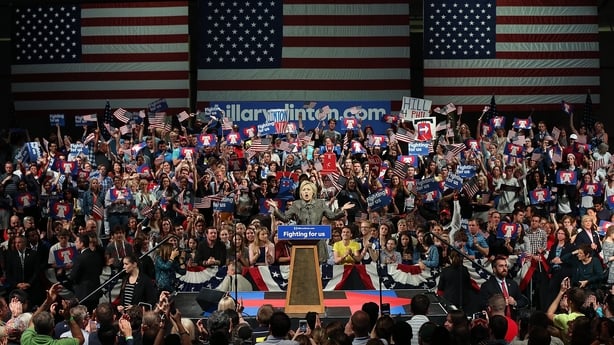
Crucially she won the big state of Pennsylvania. She has won four of the five biggest states so far, with the outstanding one being California.
Bernie Sanders won Rhode Island, which was not a major surprise there given its relative proximity to Vermont.
Mrs Clinton's speech at the victory rally was the most "general election" style speech that we have seen yet.
Again she praised Mr Sanders, and used the same phrase from last week "there's more that unites us than divides us". She also spoke of unifying the party when they return to Philadelphia in July for the convention so they can go on to win the Presidency.
She also directed all of her attack comments towards Mr Trump, not Mr Sanders.
Likewise in his speech, Mr Trump was dismissive of his Republican opponents and directed all of his ire towards Mrs Clinton, again accusing her of playing the woman card and saying if she was not a woman she would only get 5% of the vote.
It would seem that Clinton is uncatchable at this point. Does Bernie Sanders still see a way to the nomination?
Well he has vowed to take his campaign all the way to the convention and he sure has the money to do so.
But while Senator Sanders did win one state, it is about delegates at this stage.
Mrs Clinton extended her lead dramatically with the win in Pennsylvania, and he did not manage to eat into that lead sufficiently enough with the delegates he picked up - 129 to her 194.
However, he issued a statement after the results were in, hinting that while he will stay in the campaign he perhaps does not see a path to victory anymore.
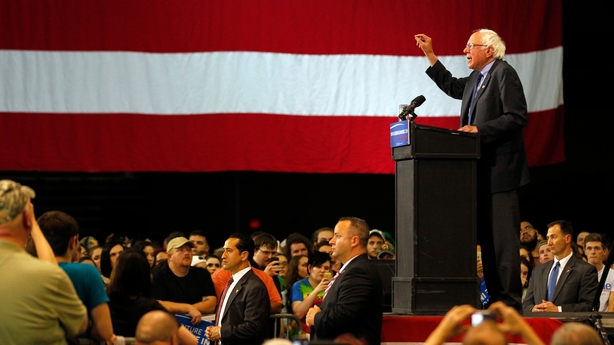
He said he would be in the race until the last vote was cast to let people in every state have their chance to vote and so he could try to impact the policy base of the party.
But ultimately the maths are very difficult for him now and that statement was a realisation of that.
Mr Trump had an idea for him though - that Mr Sanders should run as an independent.
Of course that "friendly advice" was more to do with strategy on Mr Trump's part as a split Democratic and Independent vote would make it easier for Trump to beat Clinton.
What now?
It is onto Indiana next Tuesday.
There are 83 Democratic delegates up for grabs and 57 Republican ones.
It is a state with a very conservative Republican base so if Mr Trump wins there, it really is an indicator of a turning tide and it will clear the path ahead for him.
The really big day will be 7 June in California - the last big state to vote.
With 172 GOP delegates to be decided, that could push Donald Trump over the line. And with 475 for the Democrats it is likely to clinch it for Mrs Clinton, if she does not do so before then.

